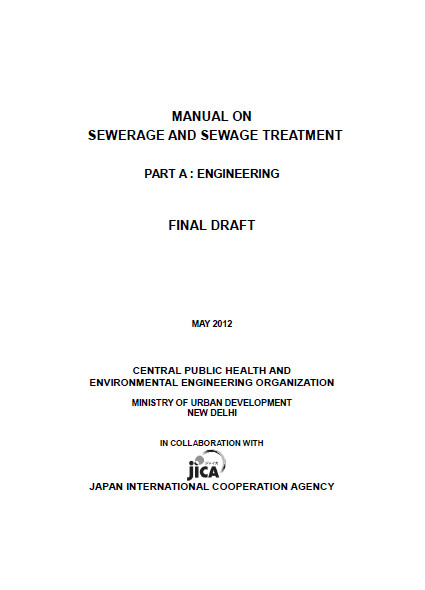Manual on sewerage and sewage treatment: Part A: Engineering
 |
manual May 2012 ; 774 páginas
Ed. MoUD - New Delhi
Formato descargable: PdF
Descargable desde el editor
Un editor presentación
 Part B: operation and maintenance
Part B: operation and maintenance
 Part C: Management
Abstract:
Part C: Management
Abstract:The manual in its introductory chapter gives an overview of the state of sanitation in cities and town.It points out that there has been progressive decline in the standard of service provided with respect to collection, transportation, treatment and safe disposal of treated sewage. The deplorable condition is more prevalent in densely populated slum areas. The large quantity of sewage when remains unattended have severe impact on people's health and on environment. The manual the goes on to elaborate on the different aspects in the management of sewage such as overburdening of the existing system, the institutional, technological, financial aspects of the urban local bodies. The present scenario of urban sanitation, the consequences of poor sanitation condition on economy, the various initiatives taken by the government to address the problem, the emerging trends and technologies of sewerage and sewage treatment are some of the other aspects covered under this section. Contents:
The manual provides detailed guidelines for practising engineers and includes the following chapters:
- Planning
- Design and construction of sewers
- Design and construction of sewage pumping stations and sewage pumping mains
- Design and construction of sewage treatment facilities
- Design and construction of sludge treatment facilities
- Recycling and reuse of sewage
- Decentralised sewerage system
- On-site sanitation
- Preparation of city sanitation plan
Destino Audiencia:
Palabras claves: |
alcantarilla (CI) (DT) (HP) (ope) , tratamiento de lodos (CI) (DT) (HP) (ope) |
País: |
Editor/Difusor: |
|
MoUD
-
Ministry of Urban Development - New Delhi - India |
Si hay un enlace roto, estaremos encantados de recibir un mensaje: communication@pseau.org